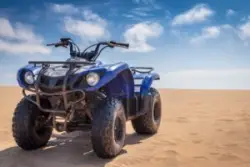
Earlier this summer, a 5-year-old boy died just hours outside Las Vegas while he was riding an all-terrain vehicle (ATV) according to news reports. The accident happened around 2 pm in Arizona. Law enforcement reported that the only one in the ATV was the young boy, who was transported to a nearby hospital where he succumbed to his injuries. According to the investigation, authorities believe that the throttle of the ATV stuck open, and the child could not stop the ATV. A family member on another ATV attempted to pull up next to the boy and pull him off but was unable to do so. The boy’s ATV crashed into a block wall. He was wearing a helmet at the time of the crash.
Understanding OHVs and ATVs
An OHV is an off-highway vehicle. Under Nevada law, Nevada Revised Statute 490.060, an OHV is defined as a vehicle that is designed primarily for all-terrain and off-highway use and includes:
- ATVs, including large ones;
- An all-terrain motorcycle;
- Snowmobiles;
- Dune buggies;
- Any motor vehicle used on public lands for recreational purposes.
Under Nevada Revised Statute 490.043, large ATVs include any ATV that has seating for at least two and a total capacity for four or a truck bed. Notably, under Nevada law, OHVs do not include motor vehicles designed primarily for use in water, low-speed vehicles, and special mobile equipment, among others.
OHV and ATV Safety Tips
Now that you have a basic understanding of what an OHV and ATV are—and what it is not—below are some safety tips that you can follow to help keep yourself and your loved ones safe. More detailed information about OHVs and ATVs, reach out to Nevada’s OHV program here.
- Train Before Riding: A major factor contributing to OHV/ATV accidents is driver inexperience. Before riding on your own, be sure to take a comprehensive OHV safety course, which is offered by local and national organizations.
- Don’t Exceed Your Limits: After you have taken a training course, understand your limitations. Drive within your abilities, and let others know this clearly if you are with other drivers who are more experienced.
- Obey All OHV Laws: Laws governing OHVs can differ depending on where you are driving. Be sure to obey all local and state laws if you are driving an OHV, including staying on marked trails, driving only in designated areas, and following all signage.
- Do Not Go on Paved Roads: Inherent in their name, OHVs are designed to be used on off-road terrain. It may be illegal to drive an OHV depending on the location and, at a minimum, doing so can increase the risk of accidents with other vehicles.
- Always Protect Yourself: Keep all parts of your body inside the vehicle when you are driving or riding an OHV. You should also wear safety gear, including a DOT-approved helmet, gloves, goggles, protective boots, long pants, and a long-sleeved shirt.
OHV Accidents Happen
Even cautious OHV/ATV drivers can be hurt in a Las Vegas accident. If you are hurt by a driver in Nevada, consult with the experienced personal injury attorneys at H&P Law. Our team of experienced lawyers has the expertise and knowledge to fight for the best compensation available to you.




